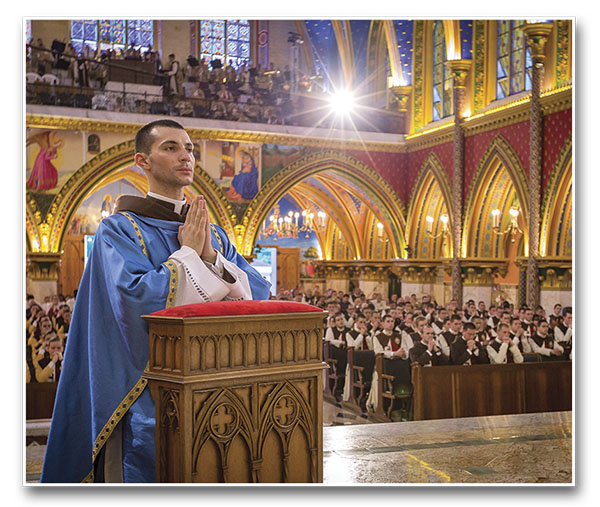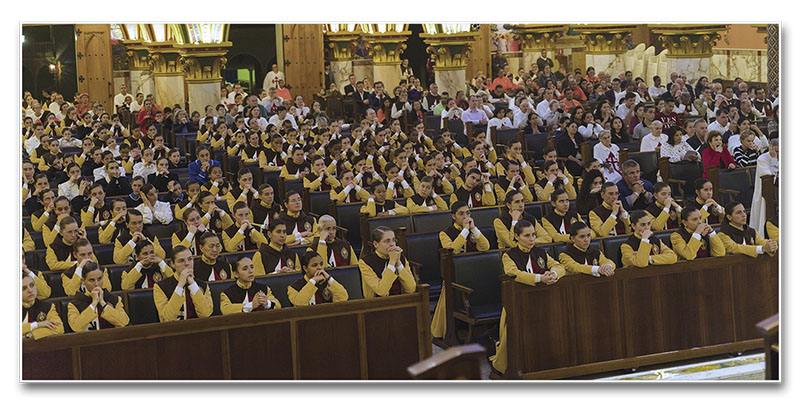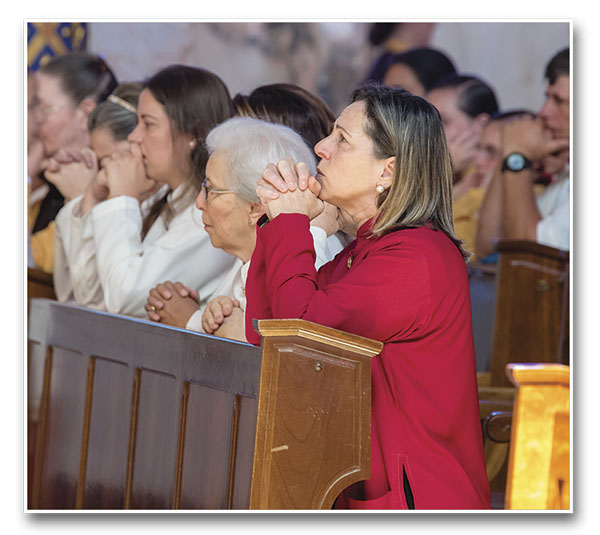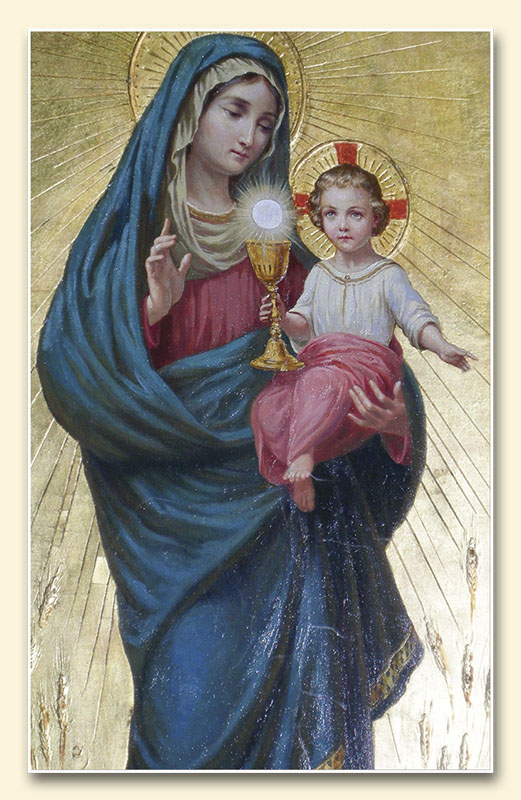After receiving the Holy Eucharist, we should remain recollected in order to fully benefit from the graces of such a sublime mystery. How should we treat these moments of sublime interaction with Our Lord Jesus Christ?
Inferior realities always reflect superior ones. This was the rule followed in the creation of the countless number of beings coming forth from God’s hands, so diverse and yet so harmonious among themselves.
This is the case, for example, with the perfect constitution of the human organism, which mirrors the Mystical Body of Christ, the Church. This sacred institution, though it arose later in time, constitutes the model according to which our body was created. God, so to speak, first thought of what was most important.
Something similar also happens with human nourishment.
The conviviality is more important than the meal
Our lives are made up largely of repetitive activities. Our night’s rest, our morning routine, our walking around and performing everyday tasks certainly holds no novelty…
Eating is also part of everyday life. However, there is a big difference between an ordinary daily meal and a festive banquet. On special occasions, careful preparation is indispensable. Consider an important celebration, such as a Christmas dinner, a family member’s birthday or another such occasion. Everything is planned in advance: the location for the celebration, whether it should be a lunch or dinner, the number of guests, the start time, and the menu with its various dishes and wines, etc.
However, on such solemn occasions, there is something even more enjoyable than the fine food served at the table: it is the conviviality among the diners, be they relatives or friends.
Once the meal is over, this interaction becomes even more intense. Who, after dessert, has never partaken of the well-known espresso as a pretext to delightfully prolong the conversation? By contrast, what would we think of someone who hastily withdrew as soon as he finished eating? It is difficult to regard as a good friend one who does not enjoy the company of others, nor even ties to hide the fact…

Basilica of Our Lady of the Rosary, Caieiras (SP)
Pleasing conversation at the end of the banquet
Because of the reversibility that exists between immaterial and the aforementioned material realities, the meals we enjoy on this earth can help us to understand certain aspects of that Sacred Banquet which is the Holy Mass.
Thus, if at the end of a meal shared with others we seek the legitimate pleasure of good conversation, should we not seek something similar after Our Lord Jesus Christ has given himself to us as food?
Thanksgiving after Communion is precisely that moment of intense conviviality that culminates the divine Banquet. We ought to ask ourselves: do we give it due importance?
Some of the Eucharist’s immense benefits
Before we deal with how to make a fruitful thanksgiving, we should recall some of the immense spiritual benefits that the Blessed Eucharist brings us in Communion.
In the Sacred Host we receive not only a great grace, but the Creator and Source of all grace! This is the principal reason why the Eucharist is the most excellent of Sacraments: it contains Christ himself substantially, while the other Sacraments contain only an instrumental power participating in Christ.1
As if this were not enough, with the Incarnate Word – in His Body, Blood, Soul and Divinity – the Father and the Holy Spirit are given to us in the Eucharist by virtue of the ineffable mystery of the perichoresis, which makes them inseparable.
Thus, in receiving Holy Communion, we truly become a living temple of the Most Blessed Trinity. And to such an extent do we become mysteriously and truly associated with the intimate life of the three Divine Persons, that in our soul the Father begets the Only-begotten Son, and from both the proceeds Holy Spirit, by the infinite act of mutual love.
God divinizes and transforms us
If holiness consists in perfect union with Christ, there can be no doubt that the life of every Catholic must have the Eucharist as its centre. There is nothing more salutary than to receive the Sacred Host in Communion. It is the most sublime spiritual sustenance and, unlike what happens with material food, which is assimilated by the body, it is Our Lord who divinizes and transforms us into himself when we receive the Sacred Species.2
For this reason, when St. John Bosco was studying at the seminary, he was not content to receive Communion only on Sundays. He often skipped breakfast and went unnoticed to an adjacent church. After receiving the Eucharist and making his thanksgiving, he returned in time to enter the classroom with his colleagues. On those occasions he fasted until lunch, and although his body suffered, his soul benefited enormously. As he himself said, this was the best nourishment for his vocation.3
With some of the benefits that we receive in Communion explained and recalled, it becomes easier for us to understand the importance of a heartfelt act of thanksgiving to God for the immense goodness shown in granting us a share of the heavenly reward here on earth.

Hints for taking advantage of this ineffable conviviality
After receiving the Body of Christ, we must allow some time for thanksgiving. Although it is a very serious moment, given the great gift we have received, thanksgiving is not something burdensome or difficult for our soul, as one might imagine. On the contrary, it consists of an expression of love and gratitude born from a filial heart.
An example of this is St. Gemma Galgani, who, after receiving Communion early in the morning – which she did daily – would spend the first half of the day with her soul in thanksgiving and the other half preparing for the following day’s Communion, such was her devotion to the Blessed Sacrament.4
Now those who, like this Italian mystic, are accustomed to receiving the Eucharist frequently, as well as those who receive Communion sporadically will benefit by keeping in mind certain points that diminish the fervour for Jesus in the Blessed Sacrament in our hearts.
Especially dangerous for the first group is the spirit of routine, which renders this vital moment of prayer sterile, reducing it to predefined observances. Some people are not satisfied until they have recited, often mechanically, formulas written in breviaries.
For the second group, their lack of frequent reception of the Eucharist, sometimes due to their not seeing it as an important practice, can make it difficult for them to know what to say to God. Their attention ends up being carried along by the winds of other concerns and thoughts, inevitably earthly…
Prayers found in pious books should be an aid for us, not an end. They should be used to the extent that they help us to elevate our souls, acting as a “runway” for our soul to soar to the sublime encounter with Our Lord Jesus Christ.
A Friend who wishes to hear and speak to us
The moments following Communion should be, for us, the most precious of the day: full of seriousness, but also of simplicity and intimacy.
Who among us does not wish to have a confidant with whom to share his problems and difficulties, his joys and his hopes? Well, this happens during thanksgiving: God enters us as one who visits a best friend. But this friend with whom we converse is none other than Our Lord Jesus Christ! It is truly difficult to imagine anything better…
God wants to listen to us, but He also wants us to listen to Him. This is why we must remain recollected at all costs, trying to ward off any thoughts that deviate our attention.
The devil will undoubtedly try to use ordinary things to get in our way and cause us to neglect this communication with the supernatural. Let us heed the advice that St. Teresa of Jesus gave to her nuns: “Do not miss this good opportunity to negotiate [with God], which is the moment after Communion.”5
But in reality, what is there to “negotiate” if we can only profit? Christ is present in our hearts, and desires nothing other than to fill us with graces and blessings.
Four acts that help in making our thanksgiving

thanksgiving after Communion –
Basilica of Our Lady of the Rosary, Caieiras (SP)
Fr. Antonio Royo Marín affirms that “the best way to give thanks is to identify oneself, through love, with Christ himself and to offer Him to the Father with all His infinite riches, as a most sweet oblation, for the four objectives of sacrifice: adoration, reparation, petition and thanksgiving.”6
In fact, many authors use these four points – constituent elements of the religious act or worship – as a basis for making a complete thanksgiving. And while there are written formulas which help in the meditation on each of these points, we should not disregard the use of our own words. God desires to hear them because they are unique and exclusive. Indeed, He created each person to love Him in a specific and unrepeatable manner.
Therefore, I should adore Him for who He is: the God of infinite mercy and justice, whom I love immensely. I must thank Him for having poured out His love upon me in creating me, for accepting me as His child through Baptism, in living within me through Communion. I am obliged to beg forgiveness for my sins and faults, for my ingratitude and the times when I have offended Him; I am deserving of hell, but I have faith in His infinite forgiveness, which I invoke so that reparation be made for the sins of the world. Finally, it is fitting to ask for what I need, the graces necessary for my sanctification and for those for whom it is my duty to pray.
The “secret” of a good thanksgiving
Undoubtedly, the “secret” to making a good thanksgiving is to ask for Our Lady’s help and intercession when receiving Holy Communion.
Who better than She knows how to adore, thank and love her Divine Son, and to ask Him for what we need? We ought, therefore, to always turn to Mary Most Holy, so that She may inspire within us a form of thanksgiving entirely in keeping with that which She made when She received the Eucharist in the Upper Room.
May the Mother of God herself console in our souls Jesus Christ in His sorrowful Passion, which is renewed at every Mass in an unbloody manner. May She speak for us words of affection that correspond to such a worthy Guest, and may She, ultimately, allow us share in the sublime and eternal bond that joins the Sacred Heart of Jesus and her Immaculate Heart, the model of the perfect union of a virtuous soul with the Blessed Sacrament in Communion. ◊

Church of Sts. Claudius and Andrew of the Burgundians, Rome
Thanksgiving after Communion,
through Our Lady
Plinio Corrêa de Oliveira
O Mary Most Holy, my Mother, Thou hadst so many things to say to thy Divine Son when He was in thy womb. Behold the paltry words I say to Him… and tell Him on my behalf what I would like to say, if I knew what Thou didst say to Him when He was in thy womb. Speak to Him for me, my Mother, and tell Him all that I would like to tell Him, but am unable. Adore Him as I would like to adore Him but – oh, sorrow! – am not capable. Offer Him the thanksgiving that I should offer Him but do not know how. Present to Him acts of reparation for my sins and those of the whole world, with a fervour which unfortunately I do not have. My Mother, ask on my behalf for everything my soul needs, everything humanity needs, in order to establish thy Reign on earth. For what I ask of Thee, my Mother, more than anything else, is the triumph of thy wise and Immaculate Heart, and the establishment of thy Reign, within me and over all men. So be it.
Notes
1 Cf. ST. THOMAS AQUINAS. Summa Theologiæ. III, q.65, a.3.
2 Cf. ROYO MARÍN, OP, Antonio. Teología de la perfección cristiana. Madrid: BAC, 2018, p.453.
3 Cf. CERIA, SDB, Eugenio. Don Bosco con Dios. 4.ed. Madrid: CCS, 2001, p.39.
4 Cf. GERMAN DE SAN ESTANISLAU, CP; BASILIO DE SAN PABLO, CP. Santa Gema Galgani. Vita de la primera Santa del siglo XX. 5.ed. Madrid: Palabra, 2010, p.298.
5 ST. TERESA OF JESUS. Camino de perfección, c.34, n.10.
6 ROYO MARÍN, op. cit., p.457.







